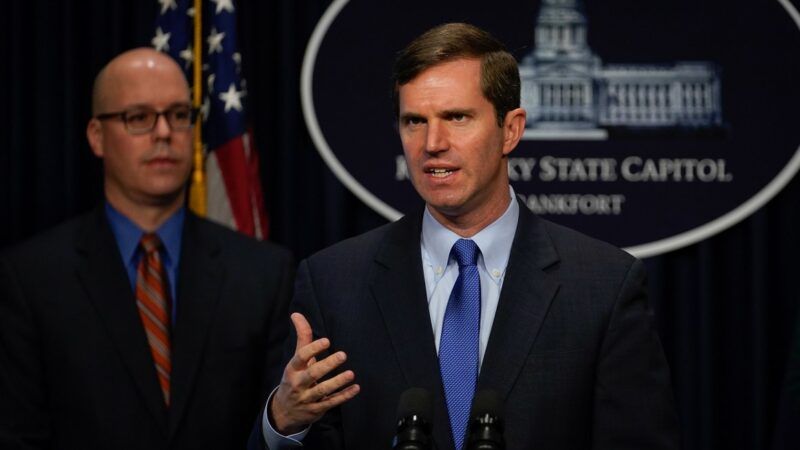Kentucky's Governor Wants School Choice for His Kids but Not Yours
A legal assault on charter schools will deprive families of educational options.

Kentucky legislators have in recent years fought an uphill battle to expand education options for children. Now, a law to belatedly fund a neglected charter school program faces a court challenge as well as opposition from the state's governor, education commissioner, and the traditional public-school establishment. The outlook is grim for Kentucky families seeking something better than the one-size-fits-some schooling offered by government institutions—the sort of "better" their governor gave his own kids.
"Kentucky's largest school district is suing over a new state law that would force the district to oversee one of the state's first charter schools," the Louisville Courier Journal reported earlier this month. "A lawsuit filed … on behalf of Jefferson County Public Schools, the Dayton Independent Board of Education and the Council for Better Education is seeking to block the implementation of House Bill 9."
The Council for Better Education represents 168 of Kentucky's 173 traditional public-school districts. Basically, government education bureaucrats are trying to head off competition.
For non-bureaucrats, House Bill 9 should be uncontroversial. It bankrolls popular publicly funded but independently managed charter schools. These are legal in 45 states and have grown to represent 7 percent of all public school students. Charters were nominally legalized in Kentucky 2017 but lacked any mechanism for getting them off the ground, a failing which the new law corrects. Well, it will if it survives the lawsuit by the traditional public-school establishment.
Lawmakers had to override Democratic Gov. Andy Beshear's veto of the charter school funding law last spring. Since then, the governor has shown no willingness to let families pick education that works for their kids without also paying taxes for government schools they don't use.
"The charter school bill is unconstitutional," Beshear insisted at a recent press conference. "The Kentucky Supreme Court's recent opinion couldn't be clearer—public dollars have to go to public schools. I believe that precedent will be applied—or should be applied—and I believe that it was clear enough that the Supreme Court will apply it."
From Beshear's perspective, only the wealthiest should truly get access to school choice. After all, that's what he did with his own children. "Beshear's children, 10-year-old Will and 9-year-old Lila, currently attend a Louisville private school," The State Journal reported in 2019, when he took office. He praised public schools at the time but "said the family 'fell in love' with the Louisville private school after Will and Lila attended its preschool program."
The opinion Beshear references is a December state supreme court ruling that found unconstitutional a tax credit program which helps pay tuition and other costs for students seeking something better than what's offered by government schools. Even though the money would be private and not pass through government coffers, the court ruled the law violated a provision mandating that "no sum shall be raised or collected for education other than in common schools."
Charter schools, of course are "common schools"—publicly funded schools that charge no tuition—though managed by independent groups rather than the usual bureaucracy. That's reason enough for education bureaucrats accustomed to captive student populations to oppose HB 9; they dread expanded competition for the loyalty of parents and children. But, as public schools, charter schools shouldn't be vulnerable to legal barriers preventing state funding of private education. However, neither the governor nor the education commissioner will make that argument; to the contrary, they back the opponents of school choice (Attorney General Daniel Cameron, a Republican, is expected to defend the charter school law).
"If successful, this lawsuit will result in many Kentucky parents continuing to be denied an affordable option for better PUBLIC educations for their children—an opportunity available to families in 44 other states and the District of Columbia," warns Kentucky's Bluegrass Institute, which supports choice. "Such denial would also prohibit a policy that's spurred improvements in academic performance in traditional public schools in many other places, including Indiana, Florida, Atlanta, Cleveland and Chicago. The competition from school choice creates a rising tide that lifts all boats in public education, whether in traditional or charter schools."
Education experts argue over the extent to which charter schools improve education outcomes of children, though most find some benefit. Last year, a Thomas B. Fordham Institute report concluded that "increases in charter school enrollment share tend to boost the average achievement of black and Hispanic students but not white students." A 2020 Tulane University paper found that "compared with districts without charter schools, districts with high charter market share (ever above 10 percent) increase the high school graduation rate by 3-4 percentage points and improve test scores by 0.06-0.15 standard deviations."
Importantly, charter schools are schools of choice. That means that parents can pick schools that work for their kids, exit schools that don't, and try something else. Surveys consistently find that parents of children educated by means they have selected are happier than those in assigned district schools.
"Using a nationally representative sample of 13,436 students in the United States in 2016, I find that public charter schools and private schools outperform traditional public schools on six measures of parent and student satisfaction," the Reason Foundation's Corey DeAngelis wrote in a 2019 paper.
Presumably Beshear, a prominent attorney and politician, could afford tuition for private school on top of the taxes extracted to pay for public schools his family chose not to use. Not everybody has the means to pay for education twice in order to find an approach that works for their children. Charter schools and other school choice policies make options available to all, not just the powerful and well-heeled.
Kentucky families deserve the same education options their governor's children enjoyed, but which the school establishment wants to deny to the public.


Show Comments (58)